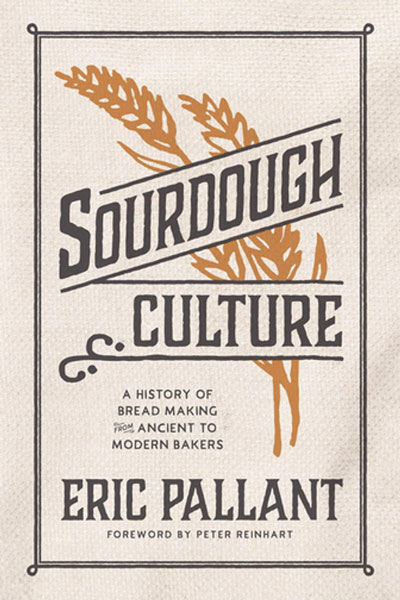Fulbright Chronicles, Volume 2, Number 3 (2023)
Author
Isaac Oluseun Adejumo

Sourdough Culture: A History of Bread Making from Ancient to Modern Bakers by Eric Pallant, who was a Fulbright Scholar to the Arava Institute for Environmental Studies (Israel) in 2001 and to Lancaster University (UK) in 2016.
My wife, a microbiologist, a bread lover, and an amateur baker, was as interested as I was when I first received Sourdough Culture in the mail. Yet, later, after we had both read the book and shared our thoughts, we agreed we had not known as much on the subject as we thought we had.
No matter how many books you have read on the subject, ‘Sourdough Culture’ offers you a unique, deep, and inter-continental experience.
This book is not just about the history of bread-making or the eternal characteristics of sourdough starters. (For non-cooks: sourdough bread requires a “starter,” often called a “culture”—hence the significance of the book’s title.) It offers much more than that. Whoever you are and no matter how much you think you know about bread-making and its history, no matter how many books you have read on the subject, Sourdough Culture offers you a unique, deep, and inter-continental experience.
Pallant, the Christine Scott Nelson Endowed Professor of Environmental Science and Sustainability at Allegheny College in Pennsylvania, explains that bread symbolizes unity across races, regions, religious and cultural beliefs, and geographical boundaries. He acknowledges that a country’s bread reflects its greatness, echoing Julia Child when she asked, “How can a nation be great if its bread tastes like Kleenex?”
Pallant examines the connection between bread and religion, noting that Jesus’s life is intertwined with bread; he was born in the “house of bread,” he fed his listeners with bread and called himself the “bread of life.” You might say that his beliefs, like bread, are shared across races, regions, and cultural beliefs.
The author also shows the significance of bread throughout history, for example, during the French Revolution. Grain shortages were a direct impetus for violence—and inspired Marie Antoinette’s famously callous statement, “Let them eat cake.”
But this is also a personal story, and Pallant explains that he was inspired to trace the history of sourdough starters when confronted with a question about the starter he used to make his own bread. “If I had kept this starter alive for twenty years, and it was alive in the Mamula household [friends from Allegheny College] before coming to me, how old was it?” (3).
Douglas Steeples, also a friend of the Marmulas, had collected the starter years before from his grandmother, and he traced it back to an archaeological site, to a former Air Force pilot, who was thought to have brought the starter to Cripple Creek, Colorado. Guided by his friends, Pallant eventually traced his sourdough bread culture’s history back 122 years, from the Fertile Crescent through ancient and primitive kitchens to ovens and kitchens of the twenty-first century. As he tells us, “Sourdough culture, like religious belief, can be expanded and shared indefinitely” (57).
Indeed, the main focus of Sourdough Culture is how bread connects us—a similar point made by Peter Reinhart, the American baker and author of many books on the subject. This is often lacking in other books on bread-making and its history. Sourdough Culture emphasizes the “connectedness’” of bread, how it cuts across nutrition or food science, philosophy, food security, history, psychology, agriculture, technological advancement, transportation, archeology, human evolvement, and politics. This book will have world-wide appeal to bread lovers, bakers, scientists, historians, students, archeologists, engineers, technologists, politicians, psychologists, and philosophers.
Eric Pallant, Sourdough Culture: A History of Bread Making from Ancient to Modern Bakers. Evanston, Illinois: Agate Surrey. 2021. 321 pages. $29.
Biography

Isaac Oluseun Adejumo holds a doctorate in Animal Science (Feed Toxicology) and a Master’s Degree in Agricultural Biochemistry and Nutrition from University of Ibadan, Nigeria. He was a Fulbright Scholar to the Department of Animal and Food Sciences, University of Kentucky, 2019-2020. Over the years, he has focused on health, climate change, and food security-related research activities, using nutritional biochemistry, molecular biology, food/feed toxicology, in-ovo and whole animal testing approaches. Most recently, he has focused on dietary manipulations to reduce the amount of nutrients excreted into the environment by farm animals, thereby reducing air pollution and its negative impact on public health and the environment. He can be reached at smogisaac@gmail.com
